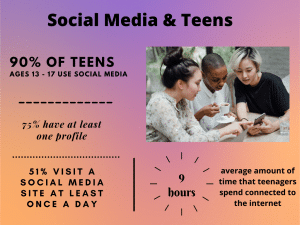What can you think of that 90% of people do? Brush their teeth? Wear underwear? How about this statistic: surveys show that at least 90% of teens ages 13 – 17 use social media, with some research putting that number at a whopping 97%. Studies also show that 75% have at least one profile and 51% visit a social media site at least once a day, with some teenage girls clocking in at over 140 minutes a day scrolling online. Some studies even put the average amount of time that teenagers spend connected to the internet per day at almost 9 hours.
All of those numbers are enough to make any parent’s head spin. It’s hard for us to even define what is “normal” for teens in this area, because, in the grand scheme of history, we’re living in a new normal. This type of technology is relatively new, with social media only really being such a big part of kids’ lives for less than a decade or so, and so far we haven’t fully come to terms with how it’s affecting our children. It is also a constantly shifting landscape, with new platforms popping up, and old ones falling out of favor. What is clear, though, is that no matter what is popular with teens at the moment, their access to and usage of social media continues to increase year by year. So what do we know about how social media affects teens? Is it all bad? And what should you be doing to make sure your kids are safe?
Tell Me Something Good
Social media can’t be all bad, right? While some people have sworn it off forever, there can actually be some benefits to it, even for young people, if parents help them use it responsibly. Social media allows teens to:
- Build social networks – These networks can be great ways to find a like minded community of young people who enjoy the same activities, as well as provide valuable support for teens who may have limitations or illnesses.
- Widen their social circle – Geographical barriers are no longer an issue thanks to social media. Having a wide social circle can teach teens a lot about others and might even stave off depression.
- Share artwork or music
- Get involved – With proper guidance, young people can learn a lot about current events from social media, and can use it to feel like they can make a difference in the world.
- Express themselves and explore their identities
The above are all positive things that parents can get behind. Not only that, but a majority of teens themselves are actually more likely to say that social media has a positive effect on how they feel. For example, 25% of teens say it makes them feel less lonely, 20% say it makes them feel more confident, 18% say it makes them feel better about themselves, and even 16% say it makes them feel less depressed.
The one thing that we need to be careful about when looking at these statistics, though, is that teens with low social-emotional well-being are much more likely to be negatively affected by social media, so it’s important to know how your teen might be experiencing their online life. For example, while only 29% of teens with high social-emotional well-being said they sometimes felt excluded when using social media, a full 70% of teens with low social-emotional well-being said they felt the same.
It might seem unrealistic to ban your teen from using social media completely, although it is your right as a parent to do so, and forbidding teens from doing anything always has the potential to backfire. So, if you do decide to allow your teen access to social media, you should be aware of the benefits of responsible use, as well as the possible negative effects it could have on your child.
Now the Bad News
While having a wide social network and a way to entertain and express themselves is definitely the positive side of social media for teens, there are some serious possible drawbacks. That wide social network could help some teens to avoid depression, but it could also negatively affect their mental health. The difference seems to be linked to how much teens use social media.

For example, A 2019 study of more than 6,500 12- to 15-year-olds in the U.S. found that those who spent more than three hours a day using social media might be at heightened risk for mental health problems. Another 2019 study of more than 12,000 13- to 16-year-olds in England found that using social media more than three times a day predicted poor mental health and well-being in teens.
The more time teens spend on social media, the more likely it is to distract them from other important things, disrupt their sleep, and expose them to bullying, unrealistic views of other people’s lives, and peer pressure. Let’s take a closer look at these issues.
- Distraction – Recent studies suggest that the overuse of social media can mirror addiction, with some reports showing that teens can experience anxiety when they’re without their devices and unable to log in to their accounts. This compulsion to be on social media can distract them from other, more important things. Teens even agree; in fact, well over 50% of teens say that social media distracts them from homework and from paying attention to the people they’re actually with at the time. 42% even say it takes away from time they could be spending with people in person.
- Sleep hygiene – We know that experts recommend shutting off all screens at least an hour before a reasonable bedtime (for teens and adults!), but social media might be affecting teens’ sleep habits beyond bedtime. 29% of teens say they wake up in the night to check their notifications.
- Cyberbullying – According to some studies, 1 in 3 teens have experienced cyberbullying; others put that number at a shocking 70%. Not only that, but some studies have shown that 70% of teens report engaging in cyberbullying others. Many others say that they don’t know how to step in and help friends, or that they’re too afraid to do so for fear of being bullied themselves. It’s important to remember that cyberbullying can actually be more damaging than the old fashioned kind: if your child is being bullied online, it is very difficult for them to escape their tormentors.
- Peer pressure – The pressure that teens feel online could go beyond being persuaded to engage in silly “challenges.” 7% say that they have been pressured online to send a sexual or naked photo of themselves.

Social media has an unrealistic view of what beauty is, making teens feel dissatisfied with themselves.
- Unrealistic expectations – It’s no secret that scrolling through social media can give you an unrealistic view of other people’s lives, and for teens this can be especially problematic. One study suggests that, for teen girls, simply spending time on Facebook can cause a “heightened desire to change their appearance.” Other studies have shown that teens who use social media passively (such as just viewing others’ photos) report that they are less satisfied with their lives, or that the longer they used social media, the more likely they were to believe that others were happier than they were.
As a parent, you’ve probably wrestled with and worried about all of the above issues with social media, but it can be sobering to see the actual statistics. So what can you do to help your teen use social media responsibly, and be more likely to get the benefits of it without the serious side effects?
What You Can Do
There are steps you can take to encourage responsible use of social media and limit some of its negative effects. Consider these tips:
- Talk about it! – This is such a simple thing, but one we as parents often neglect. One of the best things you can do with your teen when it comes to any tough topic is to be open and honest. Talk about your own social media habits, tell them how you feel about it and ask them how they feel. Ask them how they use it, and start conversations when the opportunity arises, such as when they tell you about a friend’s post, and ask them what they think is ok to share on social media. Remind them that social media is full of unrealistic images, and that everyone will be able to access information about them, including colleges and future employers.
- Encourage face-to-face time (instead of just Facetime!) – Making time for friends IRL (in real life!) is extremely important, as it helps young people develop their verbal and non-verbal communication skills. Encourage your child to find offline activities that they enjoy and encourage them to get involved. Getting together in person is especially important for teens who are prone to social anxiety.

- Set limits – Remember, you’re the parent and you make the rules! Have clear guidelines in place surrounding social media use (and internet use in general). Consider:
-
-
- Having a designated “no device” time each day
- Taking all devices at the end of the day and charging them somewhere other than your teen’s bedroom. This should happen at least an hour before bedtime.
- Making screen time an earned activity
- Setting a timer so that your child can know how much screen time they can expect
- Monitoring their account activity and always having a presence on the same sites as them
- Keeping up with their privacy settings, and using parental controls such as content filters and blockers
-
- Model good behavior – Finally, show, don’t tell, your teen how they can be responsible online. Unplug when you want them to unplug, don’t overshare on social media (and always ask your teen’s permission to post about them), and give them your full attention when they talk to you (that means no sneaking peeks at your devices!).
When most of us were kids, we didn’t have to worry about people bullying us while we were in the comfort of our bedrooms, or about how we could create a positive digital footprint. But now, most kids are thrown out there into the wide world of social media, where they could make lasting connections or end up being cyberbullied, or led down a road of dissatisfaction or even depression. We know that we can’t keep them offline forever, so the important thing is that we talk to our children about using social media as a tool and not a mindless distraction (or worse). Talk to them, set limits for them, and model the behavior you want to see in them, and you’ll set your kids up for a more positive online experience.
